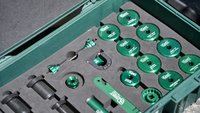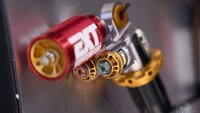I used to consider myself a bit of an audiophile, and was rather picky about things. Lately I have read a number of studies to show that most of it is just faff.
Blind test have shown that the most expensive DACs in the world cannot be reliably identified in blind test over the stock standard run of the mill stuff. The key is that levels must be matched. So when I used to think my outboard DAC was better than my inboard one, it was because it was louder. Unless there is something totally wrong with your inboard DAC, which is not out of the realm of possibility, it will likely sound as good as something costing two grand or more. Line out headphone jack should be just fine. And as long as you run the volume at 100% on your laptop and turn off windows system sounds, your CPU should not modify the signal at all to mix in other sounds.
It's also been proven that cheap amplifiers are just as good as expensive ones, as long as you have enough power to run at the volume you want. Someone's had a $10K reward for something like 30 years for anyone that can reliably identify one amplifier over another, and nobody has been able to do so. Again, the key here is that they must be level matched, and neither amp can be driven until clipping. The only reason to spend more money on an amplifier is to have more power, so you can play louder without clipping. (some amps sound better when clipping than others do when clipping. But no amplifier that's not clipping will sound better than another that is also not clipping provided they are at the same volume level .) What a shock it was to me, who thought I could do this. But not. one. person. ever. has been able to so for a $10K reward. http://tom-morrow-land.com/tests/ampchall/
Same story for HD vs CD. http://xiph.org/~xiphmont/demo/neil-young.html
There are 3 things that matter, and only 3.
1. The quality of the original recording/mastering. (Here's where some people mistakenly assume that 24/96 recordings are better than the CD… because the master is different)
2. Having enough power to play at the volume you want. Yes, this could mean you need a $2K amp, or maybe more if you want to really pump out the jams in a huge space, but generally a few hundred $$ will get you the highest of audio bliss at moderate volume for your living room.Aaaand 3. The only place you should spend frivolous cash… your speakers (this includes subs). They are the only place that makes a difference should you satisfy 1 and 2.
If you made it this far… all I'm really saying is save the money on a DAC and spend it on speakers or a sub, or more power if you want it louder.
I've been thinking this way about audio equipment for years. A few years back I spent about 3k on a pioneer system with JBL speakers, yeah it sounded good but I definitely felt the law of diminishing returns come into effect. It didn't sound better enough compared to my big 80's value village system to justify the price, at least not to me.









